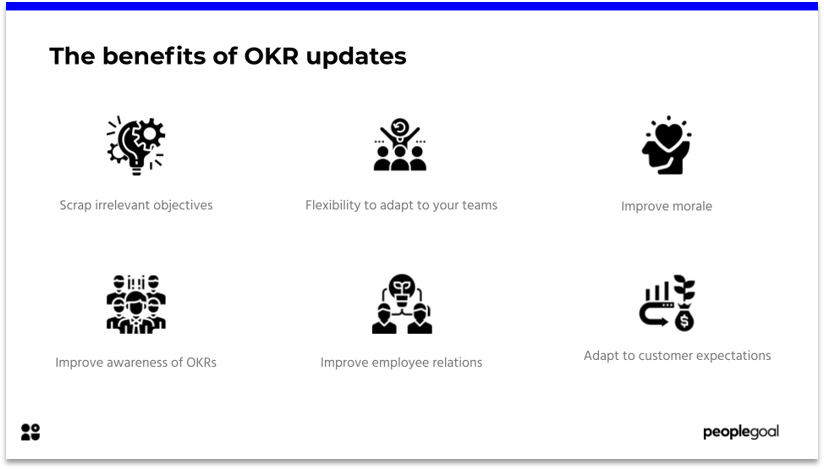OKRs (Objectives and Key Results) are a great way to align company, team and individual goals. They transform a vision or wider objectives into actionable Key Results, so that organizations are ambitious about their next steps. OKR updates are a way to tailor these to the current state of play.
As a rule of thumb, OKRs are not usually updated mid-year. However, sometimes an organisation is faced with changes that need immediate attention.
You might need to recalibrate your objectives and key results in line with unexpected changes, such as a natural disaster or pandemic. However, OKR updates are frequently used for day to day business reasons – for example, to meet the requirements of a new customer whose expectations do not match your current services. OKR updates allow you to face up to change with a clear plan of action.
Be warned, if you’re planning to update your OKRs quarterly, you will encounter some challenges. We explore 10 challenges you might face when implementing mid-year OKR updates
First, check out this quick video on what OKRs actually are. Then, we’ll take you through the more troublesome aspects of the process.
What are the benefits of OKR updates?
OKR updates come with a range of potential benefits.
- Scrap irrelevant or obsolete objectives
- Create flexibility so that managers can adapt OKRs for their teams
- Improve morale by making OKRs more workable
- Remind employees of the OKRs quarterly to ensure they are implemented
- Adapt quickly to changing customer expectations

However, OKR updates can also cause issues when it comes to employee development and company growth. Below, we explore 9 of the biggest challenges leaders face when they update objectives and key results.
Top 9 Challenges of Mid-Year OKR Updates
1. Not everyone adapts to change as well as others
Sure, your company must respond to an agile marketplace. Change will be constant as you adapt processes to your customers’ and organization’s needs. However, change is easier for some employees than others.
The danger with an OKR update mid-cycle is that you will slow down operations. Setting new OKRs each quarter means employees have to adapt each time. For some, this is exciting, but others may lose focus and feel there is a lack of communication if objectives are altered too often.
2. You risk side-lining ambitious targets
The good thing about having annual team OKRs is that they are set in stone. Objectives provide a direction of travel for your company, and key results provide the stepping stones to get you there.
The danger of OKR updates in the middle of the year is that you’ll wander off track. Ambitious organizational goals are often placed on the back burner – and replaced with smaller short-term wins.
Adapting your Key Results to match current company challenges is a positive thing. Those set in December last year won’t necessarily bite the bullet for the next quarter.
But be careful that your Key Results stay true to your current targets. It’s tempting to side-line the more ambitious ones or to water down your company-wide objectives– but these are what you need to take the next steps.

3. You’ll spend more time planning than taking action
Quarterly OKRs mean more time planning and less time acting. If you submit OKR updates every three months, you’ll need to make the changes with fair notice. You’ll usually need do your goal setting with a month to go – in the midst of pushing towards your current Key Results.
This can set you back and take focus away from your current targets. You might find that teams abandon Objectives and Key Results early because they’re looking ahead to adapt them – when a little more time and effort would have secured those targets.
4. OKRs may lack accountability
If you’re planning to make OKRs flexible, you need to have a goal process in place to ensure accountability.
Flexibility is necessary to ensure that OKRs remain relevant. Your team might lack resources to achieve that goal, or a better solution might be found. Holding onto OKRs for dear life won’t change that!
On the other hand, if employees can just hit ‘delete’ on any OKR, your system lacks accountability. You can avoid this by holding team meetings on any OKRs you plan to put on pause. Ask your team: why is this Key Result no longer relevant? What action was taken to achieve this objective, and why was it not reached?
This doesn’t just lend gravitas to the OKRs process – it means each employee carefully reviews the need for OKR updates.

5. OKR updates might prevent employees from developing
If OKR updates lack accountability – it’s the more challenging objectives that will get the boot.
Not only does this keep you from those all-important targets, it hinders employee development. Yes, stretch goals can sometimes feel unrealistic. Smaller, more concrete building blocks are often required. But stretch goals are intended to keep employees developing their skills and growing their talents.
Try to allow time for more challenging targets. Employees who fail to hit OKRs may need more support. Use one on one meetings to pinpoint any issues that are stifling their progress – don’t make any substantive OKR updates until you have spoken to them.
👉 Click here to listen to our webscast discussing employee development
6. Too frequent changes lower morale
Imagine you’re in a team that’s been working hard towards an OKR. Suddenly, you are asked to change your approach. Some of your team’s work is thrown out. Perhaps you made plans to address the goal for the rest of the quarter which you’re not able to try out.
In all likelihood, you would feel pretty demotivated. Constant OKR updates can be a time-waster and a morale-wrecker. Make sure you give your teams a chance to get started on their plans. If they have the opportunity to execute their strategy, they’ll learn much more and make more progress than if they are constantly asked to rework their OKRs.
OKRs are supposed to give employees a motivating push. Don’t let OKR updates ruin the buzz.

7. OKR updates can be too hierarchical
Your OKRs process may be very democratic. You may hold an all-hands meeting to discuss them before they are confirmed. All boxes ticked, you’re off to a great start.
But when making updates, all too often there just isn’t the time to incorporate everyone’s point of view. As such, OKR updates are usually initiated by managers and executives. Many of those who will work towards this goal are not asked for their insights.
Consequently, employees feel blindsided by changes. Your newly updated OKRs are likely to be less relevant, as not everyone has had a say on the next course of action.
8. You’ll confuse OKRs with tasks
OKRs are commonly confused with your ‘to-do’ list. Key Results are not daily tasks, as the name suggests, they are results – the intended outcome of a number of tasks.
If you’re constantly updating your Key Results, chances are you are getting bogged down in the small details. Targeting smaller tasks to Key Results is necessary, but constantly changing your OKRs to match daily tasks complicates things.
Instead, set Key Results that are ambitious. Use them to assign daily tasks that count – but make sure they create a broader picture of the outcomes the organization needs.

9. You’re less likely to monitor goal progress
Goal setting is not really about just setting goals. It’s also a process of reflecting on your progress and adapting your strategy. Managers have a vital role to play in monitoring goal progress and supporting employees to aim high. Unfortunately, many leaders provide inadequate feedback and support for their employees.
It’s crucial to monitor progress towards OKRs, as Benjamin Harkin, author and Ph.D. of the University of Sheffield writes, ‘Monitoring goal progress is a crucial process that comes into play between setting and attaining a goal, ensuring that the goals are translated into action’. In a study of 138 participants, Harkin found that those who monitored their progress towards goals were more likely to succeed.
OKRs do not work if you are not checking in with the progress of all employees. If you adapt OKRs too regularly, you don’t give employees a chance to move towards these targets. You’re also unlikely to provide them with the support they need to move forwards.
Setting fewer goals means you can review progress across time. You can highlight any areas where the employee needs to develop their skills. This creates a collaborative and supportive culture in which employees feel valued.

OKR Updates – The Takeaway
OKRs work best when they provide a clear line of sight at all company levels. Change them too often, and employees will start to lose direction.
OKR updates are often necessary. It’s important to be flexible so that your processes can respond to shifting customer, organizational and market expectations. However, remember to create a vision for every employee. Create OKRs that are the bedrock for your day to day activities, so that you are moving towards ambitious targets every day.
Ready to 3x Your Teams' Performance?
Use the best performance management software to align goals, track progress, and boost employee engagement.






